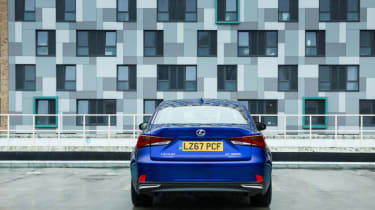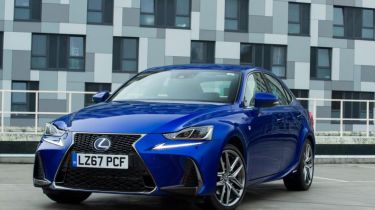Lexus IS 300h F Sport review
The Lexus IS 300h F Sport offers big refinement and low CO2 emissions, but is it enough of an upgrade for the price?
The Lexus IS 300h faces strong competition in the compact executive sector, going up against the BMW 3 Series, Mercedes C-Class and Audi A4. Such is the popularity of these three rivals that it’s easy to forget the Lexus IS 300h has plenty to offer.
One thing the Lexus does have going for it is its relative rarity – it’ll certainly stand out in the company car park, especially in the racy F Sport trim level. Opting for the F Sport model brings muscular styling, 18-inch alloy wheels, LED lights, sports suspension and aluminium interior trim. All this comes in addition to the IS 300h’s already impressive list of standard features, such as sat nav, heated electric front seats, a reversing camera, dual-zone air conditioning and a host of advanced safety systems.

The Lexus is at a disadvantage when it comes to its engine range – in a class dominated by strong diesel models, the only engine option for the IS 300 is a hybrid drivetrain. It does at least have a very low CO2 emissions figure, which puts it several Benefit-in-Kind (BiK) tax bands below its diesel rivals. This is good news for company-car drivers, even if the compromise is lower power and fuel efficiency when compared with diesel variants of the BMW 3 Series, Mercedes C-Class and Audi A4.
Despite the relative lack of power, the IS 300h F Sport is still quite a pleasant car to drive, especially if you accept that it’s not as quick as its rivals. It’s quiet and refined due to the hybrid drivetrain, and when gliding around town running on battery power alone, it’s far more hushed than any of its diesel-powered alternatives. The IS 300h is generally very refined, with the one caveat that if you do ask it to accelerate hard, the revs will flare up noisily thanks to the CVT gearbox.
The IS 300h F Sport cannot quite match the handling finesse of a BMW 3 Series but it’s not a bad car to drive; the steering is precise and the car leans less than you might expect in corners. Ultimately, while the extra weight of the car’s batteries and electric motors count against it, the IS 300h F Sport doesn’t feel completely outclassed by its rivals. The ride quality is good too; even in the F Sport spec the sportier suspension and 18-inch wheels have a minimal impact, making maintaining relatively swift progress a serene affair.

The interior is well laid out and the seats are very comfortable for front seat passengers. Those in the back might feel like the space is a little on the small side, with the BMW 3 Series and Audi A4 offering more room for rear seat passengers. Boot space is 30 litres smaller than the 3 Series’ 480 litres because of the battery pack for the hybrid system. While equipment levels are high, some of the technology is showing its age, especially the standard infotainment screen operated by a small scroll wheel mounted on the centre console.
Verdict 3/5
In a competitive sector, the IS 300h feels a little outclassed in some respects but it does offer something different. While the F Sport trim brings an attractive sporty look to the car, the standard model offers the same performance, similar equipment levels and an even smoother ride for almost £5,000 less, so it’s the one we’d buy.
Most Popular

Suzuki’s new 10-year warranty is free – here’s how to get it
Tips & advice

Car dashboard warning lights: what does each symbol mean?

Electric car charging stations: public networks, charger types, apps and maps








